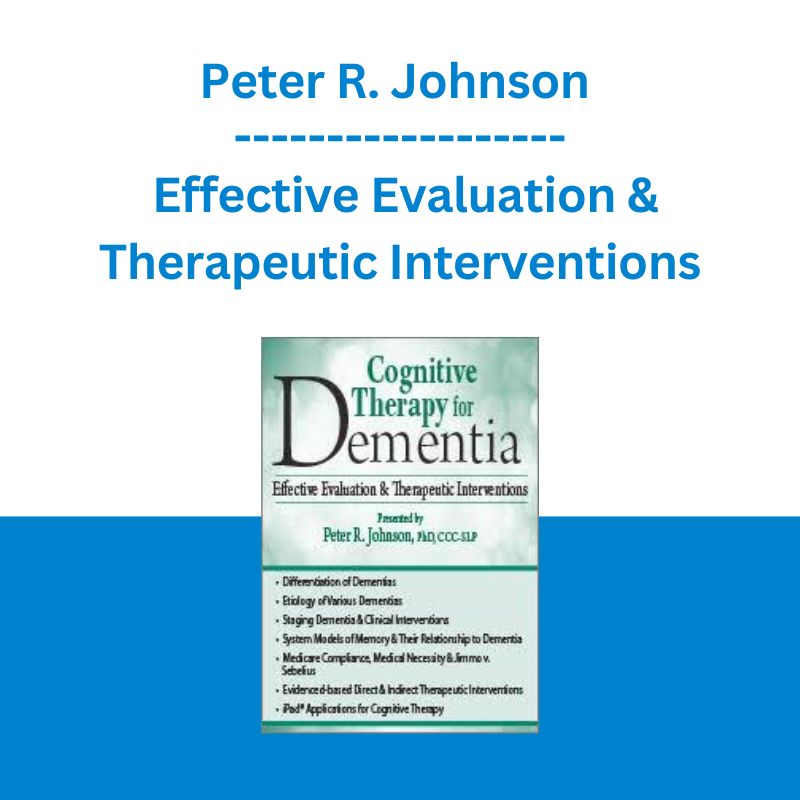*** Proof of Product ***
Exploring the Essential Features of “Peter R. Johnson – Cognitive Therapy for Dementia: Effective Evaluation & Therapeutic Interventions”
- Differentiation of Dementias
- Etiology of Various Dementias
- Staging Dementia & Clinical Interventions
- System Models of Memory & Their Relationship to Dementia
- Medicare Compliance, Medical Necessity & Jimmo v. Sebelius
- Evidenced-based Direct & Indirect Therapeutic Interventions
- iPad® Applications for Cognitive Therapy
This invaluable workshop focuses on the variables associated with learning for cognitively impaired patients. You will learn the characteristics of dementia for effective differentiation as well as how to accurately stage your patients. Take away an array of therapeutic approaches based on the patient’s diagnosis and stage level for successful intervention. This seminar will broaden your understanding of memory and pharmacology and provide evidence-based direct and indirect interventions to help you find the right approach for each patient. Additionally, you will discover how to fully comply with the recent Medicare policies and how these changes will impact treatment of your patients.
Key benefits:
- Differentiate cortical and sub-cortical, static and dynamic, and reversible cognitive impairment
- Determine the patient’s stages of dementia to modify intervention practices
- Differentiate the forms of memory and the dementia diagnosis associated with each form
- Document cognitive therapy for adult patients with dementia in accordance with Medicare guidelines
- Utilize peer reviewed research regarding treatment strategies
- Explain environmental adaptations utilized for the patient with dementia
- Utilize visual cues during therapy to facilitate memory
- Understand Jimmo v. Sebelius implications for therapy
Speaker
Peter R. Johnson, PhD, CCC-SLP
Peter R. Johnson, PhD, CCC-SLP, earned his MS and PhD in Speech-Language Pathology at the University of Pittsburgh and an Executive Graduate Degree in Healthcare Financial Management from Ohio State University. As a healthcare consultant , Dr. Johnson develops continuing education programs, coaches one-on-one mentoring, and assists in the development of memory units. His previous experience includes working in acute care, home care, outpatient clinics and long-term care.
Dr. Johnson served as a Column Editor for the American Speech-Language Hearing Association (SID 13) Dysphagia Newsletter and the (SID 11) Administration and Supervision Newsletter. He is a four-time recipient of the President’s Award and the Outstanding Service Award from the Florida Association of Speech-Language Pathologists and Audiologists. He is the Chair of the Florida Department of Health State Licensing Board for Speech- Language Pathologists and Audiologists.
Dr. Johnson has co-authored several books including Business Matters: A Guide for the Speech-Language Pathologist; Drugs and Dysphagia: How Medications Can Affect Eating and Swallowing and Practical Pharmacology in Rehabilitation: Effect of Medication on Therapy and the newest book, A Clinician’s Guide to the Successful Evaluation and Treatment of Dementia, published in 2016.
Speaker Disclosures:
Financial: Peter Johnson maintains a private practice. Dr. Johnson receives royalties as an author for Pro-Ed and Human Kinetics. He receives a speaking honorarium from PESI, Inc. He has no relevant financial relationships with ineligible organizations.
Non-financial: Peter Johnson is Chair of the Florida Department of Health/Board of Speech-Language Pathology and Audiology.
Target Audience
Counselors, Marriage & Family Therapists, Nurses, Nursing Home Administrators, Occupational Therapists & Occupational Therapy Assistants, Physical Therapists/Physical Therapist Assistants, Social Workers, Speech-Language Pathologists, and other Mental Health Professionals
Objectives
- Communicate the differences between cortical and sub-cortical dementias.
- Evaluate and accurately stage the patient with cognitive impairment to inform clinical treatment interventions.
- Discriminate the forms of memory and the dementia diagnosis associated with each form.
- Utilize an appropriate iPad® application for cognitive therapy.
- Articulate one functional long-term goal and two functional short-term goals for cognitive therapy.
- Implement the appropriate therapeutic intervention strategies for different cognitive impairments.
Outline
Differentiation of Dementias
- Cortical & Sub-cortical
- Static or Dynamic/Reversible
Etiology of Various Dementias
- Alzheimer’s
- Parkinson’s
- Vascular Dementia
- Huntington’s
- Lewy Body
- Frontotemporal Dementia
- Wilson’s
- PSP
- Cerebral Degeneration
- Basil Ganglia Degeneration
Stages of Dementia/Clinical Staging
Identification of Models of Memory & Their Relationship to Dementia
- Etiology & Symptoms
- Sensory Memory
- Working Memory
- Declarative Memory
- Non-declarative Memory
Medicare Compliance, Medical Necessity, Goal Writing
- Jimmo v. Sebelius – Impact on treatment
Evaluation Tests
- Brief Cognitive Rating Scale
- Global Deterioration Scale
- St. Louis University Mental Status Test (SLUMS)
- Stroop Test
- Trails A & B
- Cognitive Linguistic Quick Test
- Scales of Cognitive and Communication Ability for Neurorehab (SCCAN)
- Environmental and Communication Assessment Toolkit for Dementia (ECAT )
- MCI Screen
- Allen Crosswalk & Cognitive Levels
Direct Therapeutic Interventions for Dementia
- Spaced Retrieval
- Priming
- Reminiscence Therapy
- Medications
- Montessori Principles
- Allen’s Techniques
- Chaining Techniques
- Attention Training Techniques
- Sensory Stimulation Techniques
- Errorless Learning Techniques
- Meta-memory Exercises
- Cognitive Rehab Dining
- Appropriate iPad® Apps for Cognitive Therapy
Indirect Therapeutic Interventions for Dementia
- Environmental Adaptations
- Assistive Techniques for Cognition
- Simulated Presence Therapy
- Linguistic Manipulations
- External Aids
- Caregiver Education
Please see the full list of alternative group-buy courses available here: https://lunacourse.com/shop/









